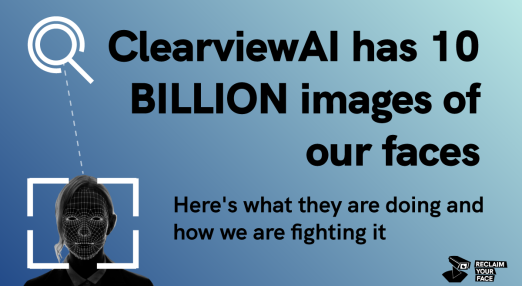The European Parliament must go further to empower people in the AI act
Today, 21 April, POLITICO Europe published a leak of the much-anticipated draft report on the Artificial Intelligence (AI) Act proposal. The draft report has taken important steps towards a more people-focused approach, but it has failed to introduce crucial red lines and safeguards on the uses of AI, including ‘place-based’ predictive policing systems, remote biometric identification, emotion recognition, discriminatory or manipulative biometric categorisation, and uses of AI undermining the right to asylum.
Filter resources
-

The European Parliament must go further to empower people in the AI act
Today, 21 April, POLITICO Europe published a leak of the much-anticipated draft report on the Artificial Intelligence (AI) Act proposal. The draft report has taken important steps towards a more people-focused approach, but it has failed to introduce crucial red lines and safeguards on the uses of AI, including ‘place-based’ predictive policing systems, remote biometric identification, emotion recognition, discriminatory or manipulative biometric categorisation, and uses of AI undermining the right to asylum.
Read more
-

Policing: France proposes massive EU-wide DNA sweep, automated exchange of facial images
The French Presidency of the Council is seeking EU-wide comparisons of every DNA profile held by police forces against all those held by other national police forces, as well as EU policing agency Europol, as part of plans to upgrade the ‘Prüm’ network of police databases. It also hopes to automate the police exchange of facial images by eliminating requirements for human review.
Read more
-

EDRi-gram, 20 April 2022
In this edition of the EDRi-gram, we look at how you can influence the AI Act in order to ban biometric mass surveillance across Europe. We also raise our concerns with the new Cybercrime Protocol which threatens to undermine our privacy to compensate for the rising powers of law enforcement authorities. Don't miss out to learn who the biggest data sinners of the last year are, join the German Big Brother Awards 2022. In previous years, the Big Brother Awards have placed a spotlight on threats to privacy and basic rights, including loyalty cards, credit scoring, toll cameras, colour photocopiers or mobile phone surveillance.
Read more
-

CNIL orders three controllers to comply with GDPR after decision that using Google Analytics is illegal
Only weeks after the groundbreaking decision by the Austrian Data Protection Authority that the continuous use of Google Analytics violates the GDPR, the French Data Protection Authority (CNIL) ordered three French websites to comply with the GDPR. All these decisions are based on noyb's 101 model complaints which were filed after the Court of Justice ruling invalidating Privacy Shield. noyb expects similar decisions by the other authorities.
Read more
-

How can you influence the AI Act in order to ban biometric mass surveillance across Europe?
The EU is currently negotiating the Artificial Intelligence (AI) Act. This future law offers the chance to effectively ban biometric mass surveillance. This article aims to offer an overview of how the EU negotiates its laws and the key AI Act moments in which people can make their voices heard.
Read more
-

Europol’s reform: A future data black hole in European policing
The European Parliament is soon due to vote on the powers expansion of the European Union’s law enforcement agency, Europol. Civil society has been extremely critical of Europol’s mandate revision, raising many concerns with regards to the lack of fundamental rights protections and policymakers’ blind and absolute trust in how the agency will use its new powers. All the more reasons to be worried: the result of the trilogue negotiations with the Council of the EU made it even worse.
Read more
-

New Cybercrime Protocol will undermine our privacy to compensate for the rising powers of law enforcement authorities
This new international agreement raises serious concerns as its shortcomings promise to undermine the safeguards to our fundamental rights, including our privacy and procedural rights.
Read more
-

A new crisis response mechanism for the DSA
EDRi is one of 38 civil society organisations jointly raising our voices to the DSA negotiators to stop negotiating outside their respective mandates and respect the democratic process of the EU. We demand concrete improvements necessary for the Crisis Response Mechanism (CRM) to respect international human rights law and prevent the future abuse of those emergency powers. Add your voice now!
Read more
-

About ClearviewAI’s mockery of human rights, those fighting it, and the need for EU to intervene
Clearview AI describes itself as ‘The World’s Largest Facial Network’. However, a quick search online would reveal that the company has been involved in several scandals, covering the front page of many publications for all the wrong reasons. In fact, since New York Times broke the story about Clearview AI in 2020, the company has been constantly criticised by activists, politicians, and data protection authorities around the world. Read below a summary of the many actions taken against the company that hoarded 10 billion images of our faces.
Read more
-

Criminal complaint against illegal export of surveillance software is making an impact: the FinFisher group of companies ceases business operations after its accounts are seized by Public Prosecutor’s Office
Following a criminal complaint filed by the Society for Civil Rights (Gesellschaft für Freiheitsrechte e.V.), Reporters without Borders (RSF), the European Center for Constitutional and Human Rights (ECCHR) and netzpolitik.org over illegal exports of surveillance software, the Munich-based corporate group FinFisher has ceased its business operations. The Public Prosecutor’s Office Munich announced that it had seized the company’s accounts, after which FinFisher GmbH and two partner companies filed for insolvency.
Read more
-

The Clearview/Ukraine partnership – How surveillance companies exploit war
Clearview announced it will offer its surveillance tech to Ukraine. It seems no human tragedy is off-limits to surveillance companies looking to sanitise their image.
Read more
-

EDRi-gram, 6 April 2022
In this edition of the EDRi-gram, we look at what the facial recognition company Clearview AI is doing with our faces in the Ukrainian war and how we can put stop the private company from exploiting the war. We also urge the French Council Presidency to follow through on its promise to ensure that a final deal on the DSA prohibits the use of sensitive data, including the drawing of inferences about a person’s sensitive characteristics, to display advertisements.
Read more
